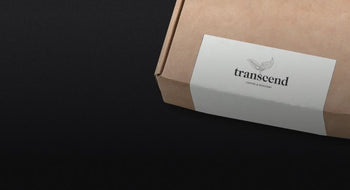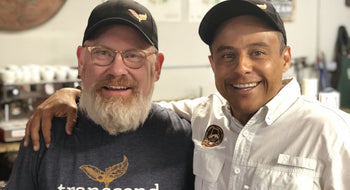Interview With Our Founder Poul Mark

Interview With our Founder:
We’re sure you’ve heard about the accolades of our founder, Poul Mark. Also known as a father, husband, writer, friend and adventure enthusiast, Poul has been dedicating this decade to adventure, connecting and rediscovering. From discussing his core values to acquiring a better understanding of what motivated his coffee journey, we were able to sit down with Poul to learn a little more about his “why”. In this interview, we discussed what kick-started his journey with transcend and the inherent uniqueness it has in terms of prioritizing relationships.
- What kick-started your interest in coffee?
I was a coffee drinker throughout my university years, and it continued to permeate my life after I finished school. I also came from a Scandinavian home, and the Danish people drink a lot of coffee. I was intrigued by the coffee culture when it first started. I distinctly remember when Starbucks came out with the revolutionary idea of making coffee taste savoury and flavourful. Prior to this, coffee lacked “boldness”, and it was watered down. Not only was it bland, but it lacked the inherent characteristics of the coffee bean that is usually brought out in well-made coffee.
- How did this transcend into creating a business?
Well, initially, I became somewhat of a wine connoisseur. In this, I discovered that I have a palate that can identify the nuanced and inherent flavours in wine and coffee. After refining my palate through wine, I took my learnings and applied them to coffee. I also found it interesting that Starbucks created this idea of “a third place”, bringing the community together was something that I wanted to do. I wanted to create a place where individuals could come and feel included and celebrated for their individuality. I wanted to create a space where coffee was the reason for which people were able to gather. I learned as I went. The process was cumbersome, and there were many roadblocks, as I had never built a business from scratch before. It was a steep learning curve, for sure.
- What are some misconceptions you want to address about the coffee industry?
I think one of the most common misconceptions is the idea of Fair Trade being “fair”. It was set out to be beneficial to small producers and larger scale coffee producers, but there’s a reality of a lack of sustainability. There’s also a lack of equity that unfortunately remains omnipresent in Fair Trade deals. Notably, when we talk about sustainability, we’re addressing sustainability through a fiscal lens, rather than an environmental lens. While the environment is incredibly important, we also want to address creating relationships with producers that not only allow for longevity; but ensure farmers are paid a living wage. In our previous article, we addressed the difference between a living wage and a “fair wage” and the discrepancies between the two definitions. We are hoping to create an adaptable wage that can accommodate the fluctuations and volatility of the “c” market price. For brevity, we want to ensure that despite climate-imposed market fluctuations, farmers can earn an income that allows them to live far above the poverty line.
- What excites you the most about the coffee industry?
I would consider myself an extroverted individual, so I draw a lot of my energy from being around people and fostering relationships. What I enjoy the most is the meaningful connections I’m able to make through transcend. There’s intimacy in establishing an authentic connection with someone. Specifically, I think my time in Panama kick-started my experience in the coffee industry. I was able to meet producers and develop relationships that I could then carry over into our business.
What I found particularly captivating was uncovering the plight of coffee producers. The rhetoric that currently exists diminishes the extreme poverty that many coffee farmers face globaly. A lot of people are blissfully unaware of how pervasive debt is for coffee farmers. When I was in Panama and subsequently other countries, visiting a variety of different producers, I had to ask myself, how do I rectify this? How do I help alleviate this reality instead of just contributing to the problem like many other coffee companies?
The problem is that transcend cannot single-handedly mitigate the effects of poverty for coffee producers, but perhaps we can help increase the transparency surrounding the realities of coffee production; this is ultimately our aim. While this is no simple feat, and I’ve had my share of individuals countering my proposal as a laughable or dismissible affair, we have to at least try.
One of my favourite parables is the man walking on the beach after a devastating storm. He saw countless starfish that had washed up on shore from the storm. He grabbed as many as he could and threw them back into the ocean. when he was finally approached by a stranger, the stranger asked why he was throwing them back in the ocean, when the ominous reality was that there were far too many to make a difference. The man told the stranger that he might not be making a huge difference in comparison to all of the starfish on the beach, but he can make a difference in the singular lives of the starfish he is throwing back into the ocean.
In transferring this to the coffee industry, while Transcend holds no significant amount of power in the realm of coffee in comparison to larger-scale operations, we hope that we make a difference in the lives of the producers we work with.
- What do you want consumers to know about you?
I think people associate me with the adventure side of things, but my core values are ultimately what motivates me and are precursors to my everyday actions. One of my deepest core values is generosity. My ethics are truly what has driven the direction of this company. I’ve been influenced by humanitarian ideals as well. My time as a lawyer allowed me to help a variety of different individuals and try to ensure that they were accorded the justice they deserved. I’m not one to sit apathetically or idly by while someone is being exploited.
- How do you think transcend differs from other coffee businesses?
One of the things we do exceptionally well at transcend is to cultivate relationships. We’re essentially built on relationships. It’s the reason we have a clientele that keeps coming back. When I travelled to origin, I was allowed to build meaningful relationships with producers. This helped alleviate the internal conflict I was facing while trying to build a coffee business without negating the ubiquitous reality of poverty that coffee producers face. It was important to me, as I said earlier, that I was part of the solution, rather than simply contributing to the problem. This was something I was very passionate about. I think it motivated me to pursue the business side of things even more. Thoroughly understanding the plight that these farmers face made me want to spring into action.



Leave a comment